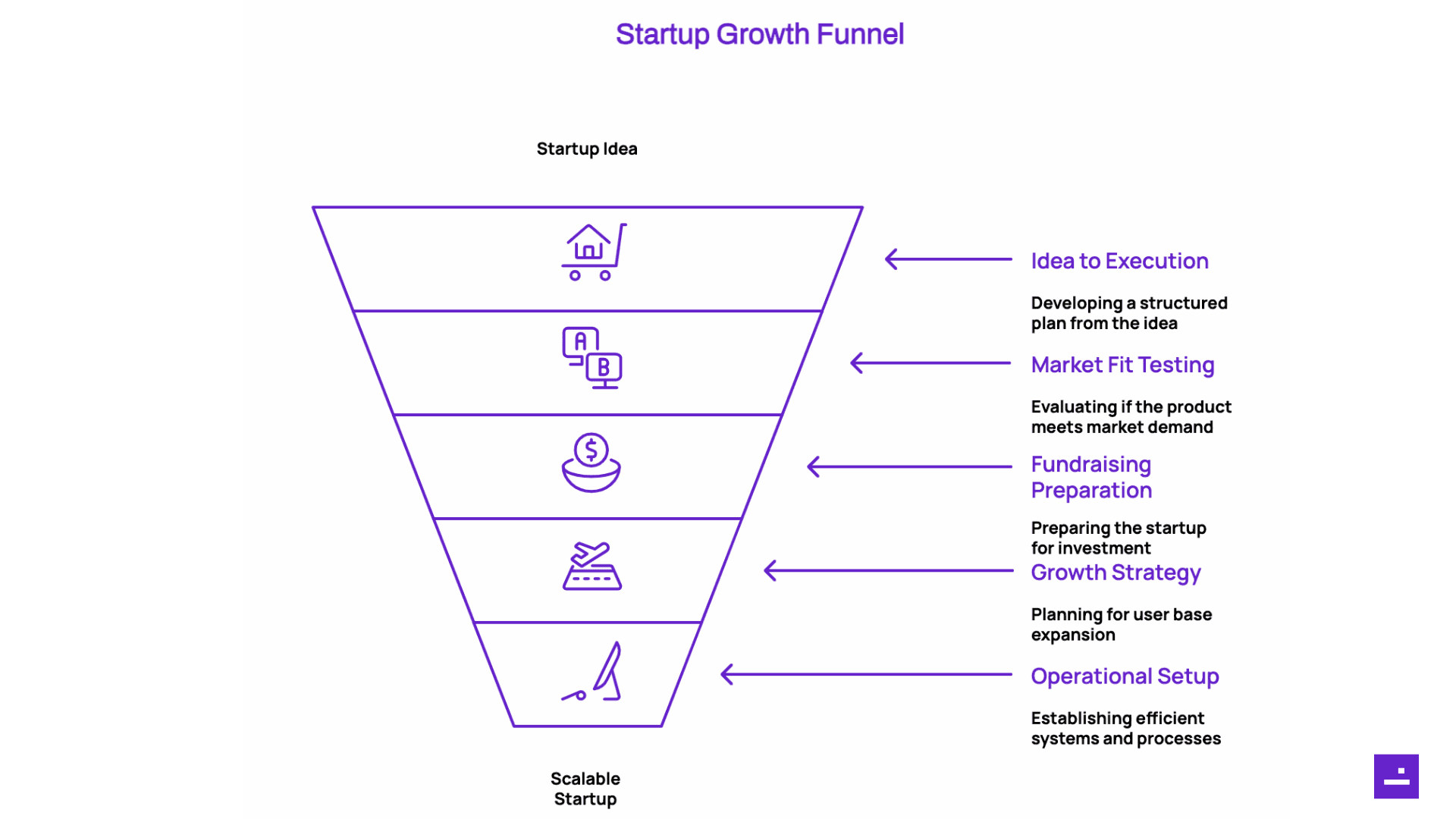Startups are thrilling, but they’re also unpredictable. You’ve probably heard the saying that most startups fail, but do you know why? According to CB Insights, 38% of startups fail because they run out of cash.That number should make any founder pause for a second. It’s not always about having a bad idea, sometimes it’s about execution, timing, and the decisions you make under pressure.
And that’s exactly where startup consulting comes in. If you’ve ever wondered whether consultants are only for giant corporations, think again. Startups, especially the ones chasing growth, can benefit from an outside perspective that cuts through the noise. Consulting isn’t about someone coming in to “fix” your business; it’s about helping you see blind spots, move faster, and avoid costly mistakes.
In this blog, we’ll break down everything from what is startup consulting, to startup consulting services, to when it makes sense to hire someone and how much it might cost. If you’ve been curious about how business consulting for startups actually works, this is your roadmap.
What is Startup Consulting?
Let’s skip the buzzwords and go straight to the point: what is startup consulting? It's all about experienced professionals stepping in to help founders navigate the messy journey of building a company. Think of them as part coach, part strategist, and sometimes part therapist.
The consultant isn’t there to run your business. Instead, they guide you, offering expertise in areas where you might lack experience. Maybe you’re a brilliant product builder but you’ve never raised funding before. Or maybe you’re great at selling but don’t know how to structure operations. That’s where a consultant fills the gap.
The role goes beyond giving advice. Good consultants roll up their sleeves. They help you figure out whether your business model makes sense, whether your go-to-market strategy is realistic, and how to avoid the traps that kill most startups in their first few years. In short, startup consulting gives you clarity at a time when uncertainty is your biggest challenge.
Services Offered by Startup Consultants
So, what do consultants actually do? The scope of startup consulting services can vary, but here are the most common areas where they step in:
- Business Strategy: Helping you define your vision, roadmap, and how to get there without chasing shiny objects.
- Market Research: Making sure your idea has demand before you pour months of effort (and money) into building it.
- Fundraising Support: Prepping your pitch deck, refining your financial model, and ensuring you’re investor-ready.
- Operations Guidance: Streamlining how your team works so you don’t drown in inefficiency as you grow.
- Product & Technology Strategy: Advising on MVP scope, product-market fit, and long-term tech decisions.
- Startup Growth Consulting: Identifying channels and growth levers that will actually drive traction.
In reality, the role adapts to your needs. Some founders need help validating an idea. Others need fundraising prep. Some are scaling and struggling with culture or processes. That’s the beauty of consulting, it’s flexible enough to fill the gap you need covered most.
Key Focus Areas of a Startup Consultant

Not all consultants are generalists. Many have clear startup consultant focus areas they specialize in. A few of the most critical include:
1. From Idea to Execution
Taking a late-night napkin sketch and turning it into a roadmap.
2. Market Fit
Helping you test quickly and brutally so you know whether people actually want what you’re building.
3. Fundraising and Investor Relations
Crafting your story, polishing your pitch, and telling you whether you’re really ready to raise.
4. Growth Roadmaps
Moving from 100 to 1,000 users, then from 10,000 to 100,000. Growth at each stage looks different.
5. Operations and Team Building
Laying down systems and processes that won’t collapse as soon as your team scales.
If you dig into startup consultant roles, you’ll notice that the best ones don’t just think big picture, they get into the weeds. They’ll look at your funnels, product onboarding, hiring pipeline, and sales process. Product strategy without execution is just theory, and founders don’t have time for theory.
Why Should Startups Consider Consulting?
You might be thinking, “Do I really need this? Can’t I just figure it out myself?” And sure, you can. But here’s the reality: the benefits of startup consulting are all about speed, clarity, and avoiding mistakes.
Here’s why founders consider it:
- Speed: What takes you six months to learn the hard way, a consultant can share in a single workshop.
- Expertise: Nobody is great at everything. Consultants fill the blind spots you don’t even know you have.
- Risk Reduction: Mistakes in pricing, hiring, or fundraising can set you back months or even sink your company.
- Investor Confidence: Walking into a pitch with a consultant-backed plan shows discipline and seriousness.
- Focus: Founders often chase too many things at once. Consultants force you to double down on what matters.
Think of it less like outsourcing your vision and more like borrowing scars from someone who’s already been through the battlefield.
When to Hire a Startup Consultant?
The tricky part is timing. If you’re still just daydreaming about an idea, it’s too early. But if you wait until things are falling apart, it might be too late. So when should you bring in help?
Here are some clear signals :
- You’ve got an idea but no roadmap to execution.
- You’re building an MVP but second-guessing every feature decision.
- You’re struggling to find your first 50–100 paying users.
- You’re prepping for fundraising but your story and numbers feel shaky.
- You’re scaling quickly and operations are breaking down.
Simply put, if you wake up often thinking “I’m in over my head”, that’s usually the right time to consider a consultant.
Also Read: How to Find the Right Software Development Partner?
How to Choose the Right Startup Consultant?
Here’s the truth, not all consultants are worth hiring. Some are all talk. Some will hand you a pretty slide deck and disappear. So how do you pick someone who’ll actually move the needle?
When figuring out how to choose a startup consultant, keep these in mind:
1. Relevant Experience
A consultant whose scaled SaaS products might not be the right fit for your consumer app.
2. Track Record
Look for proof. Past clients, case studies, even failures they’ve learned from.
3. Execution vs. Theory
Do they actually get into the weeds with you, or do they just advise from the sidelines?
4. Chemistry
You’ll be working closely. If you don’t trust or click with them, it won’t work.
5. Clarity on Cost
Understand how they charge, hourly, project-based, retainer, or equity.
The best startup consulting firms aren’t cookie-cutter. They listen, adapt, and design strategies that fit your business instead of forcing you into their framework.
Is Hiring a Startup Business Consultant Expensive?
The big question: is hiring a startup consultant expensive? The honest answer—it depends.
Some charge a few thousand for a project. Others bill like top lawyers with high hourly rates. And a few even take equity. But cost isn’t the right way to measure this. Value is.
Here’s how to think about startup consultant cost:
- Stage Matters: Early-stage startups might only need lightweight guidance. Later-stage might need deep, ongoing support.
- Scope Matters: Pitch deck prep costs far less than a six-month growth engagement.
- ROI Matters: If $10K of consulting saves you from wasting $100K building the wrong thing, was it really expensive?
For lean founders, there are also affordable startup consulting options, mentorship platforms, accelerators, or niche consultants who specialize in one area.
Partner With Startup Consultants at SoluteLabs
Now let’s make this practical. If you’re looking for more than just advice, SoluteLabs startup consulting might be the right fit. With our agile teams on demand, we’ve worked with founders across SaaS, fintech, healthtech, and consumer apps, helping them go from idea to launch to scale.
Here’s how we work differently:
- Hands-on Guidance: We don’t just suggest, we co-create solutions with you.
- Tailored Strategies: No cookie-cutter decks. Every roadmap is built around your stage and your market.
- Tech+ Product Expertise: We bridge the gap between business strategy and actual product execution.
- Fundraising Support: Helping shape your narrative, polish your deck, and prep you for investor conversations.
- Long-term Partnerships: We’re not “in-and-out” consultants. We stick around to make sure things actually work.
At SoluteLabs, consulting isn’t about giving you homework. It’s about standing beside you while you execute, so you don’t just plan growth, you live it.
Conclusion
Building a startup is messy. It’s fast, uncertain, and often overwhelming. But you don’t have to do it alone. Business consultant for startups exist for one reason: to improve your odds of success.
The right consultant won’t steal your vision or slow you down. They’ll sharpen it. They’ll bring clarity when things feel chaotic. And they’ll help you avoid the mistakes that kill most startups.
If you’re serious about giving your idea the best chance to thrive, think about consulting as an investment in your future. And if you’re looking for partners who understand both strategy and execution, SoluteLabs startup consulting is ready to walk that journey with you. Contact us today!
